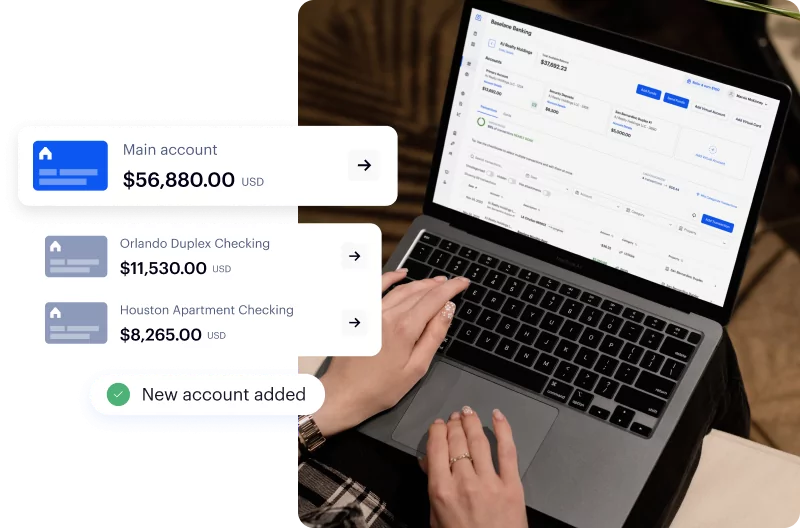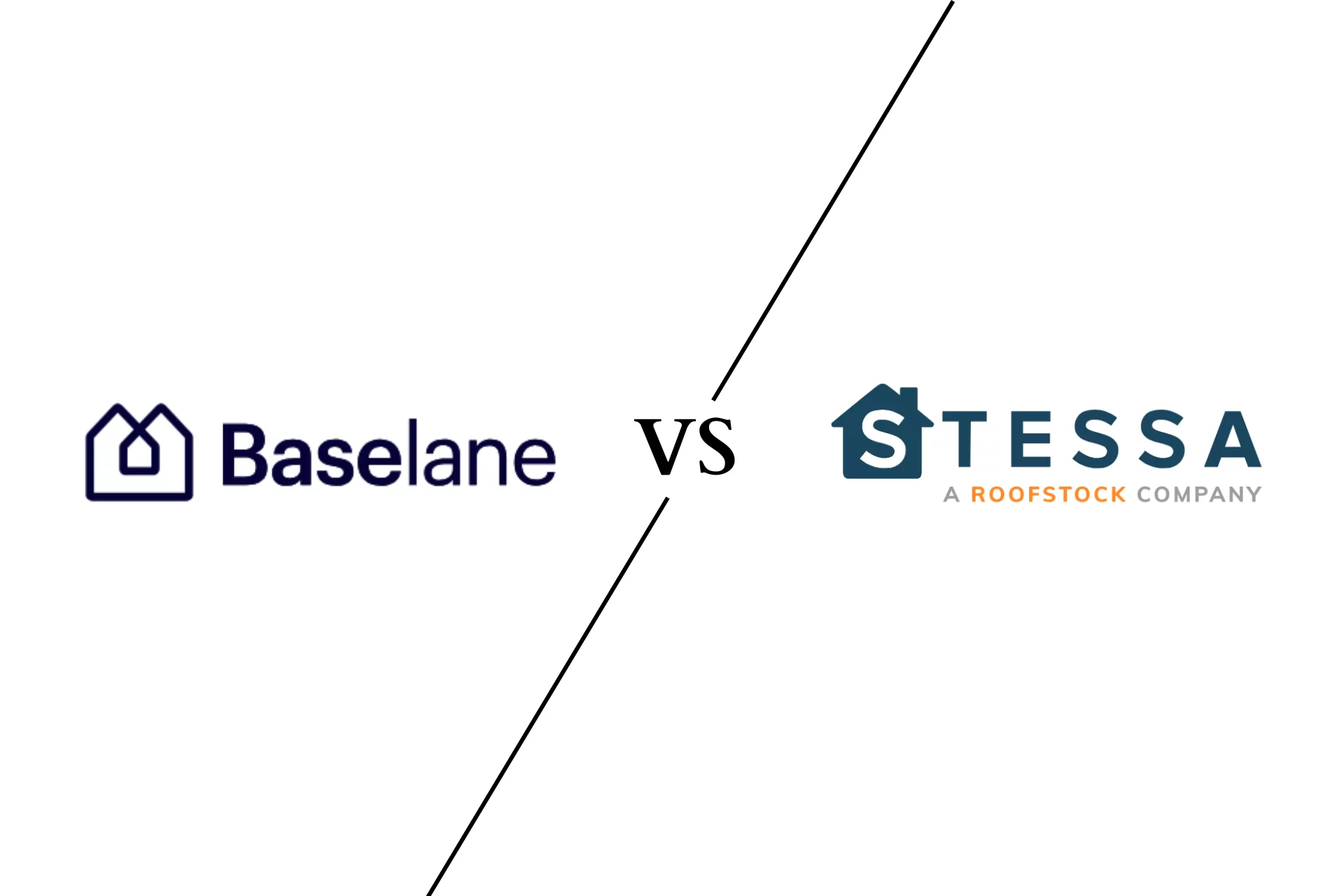When tenants move in, they pay a security deposit that’s held by a landlord until the lease ends. An escrow management system ensures these funds are securely stored and properly handled. The deposit covers any damages beyond normal wear and tear, unpaid rent, or other obligations not met by the tenant.
This guide will teach you when to collect a security deposit, how much it should be, and how to manage security deposit funds.
Why is Collecting Security Deposits Important?
Security deposits put in a no- fee checking accounts shield your rental income and property condition. They ensure tenants take responsibility for their living space and provide a financial buffer for landlords.
Here are the key reasons why security deposits or move-in fees are essential in rental agreements:
- Motivates tenants to maintain the property’s condition.
- Helps cover cleaning costs after tenants move out.
- Secures funds for repairs from property damage.
- Pays for outstanding utility bills and unpaid rent. If you need help managing these bills, consider getting a utility management software.
- Provides protection for early lease terminations.
For added benefit, you can explore how to get a high-yield savings account to grow security deposit funds while keeping them securely separated.
How to open an escrow account for security deposits?
Get instructions and state rules for setting up security deposit accounts.
Steps to Collect Security Deposits and First Month Rent
The best way to collect security deposits is through a reliable, secure online platform like Baselane, which specializes in rental transactions. As a landlord, you benefit from fast, hassle-free transfers directly into your bank account. When comparing a business bank account vs personal bank account, platforms like Baselane make it easy to manage funds professionally and stay compliant.
Here’s how to collect a security deposit online for rental properties through Baselane:
Step 1: Open a Free Account
First, sign up for a free account with Baselane. It gives you access to special banking features designed for landlords. It’s an easy, no-cost way to start managing your rental finances and helps you avoid bank fees.
Step 2: Set Up a Virtual Account for Deposits
Next, create a ‘virtual account’ in Baselane. Think of this as a special online piggy bank for rent security deposits. It keeps this money separate from other funds, making tracking easier, similar in concept to putting rent in escrow to ensure funds are properly managed and compliant with local laws.
Step 3: Collect Deposits Online
Now, you’re ready to collect security deposits. With Baselane, tenants can pay their deposits and monthly rent online. They can use bank transfers, deposit checks, or wire transfers. Payments are deposited into your Baselane virtual account or linked business bank account for landlords.
Additional Benefits of Using Baselane
- Baselane is an all-in-one property management platform that combines banking, rent collection, and accounting in one place.
- Collect and return Airbnb security deposits online.
- Earn up to 3.35% APY2 on security deposit accounts.
- Free online rent collection via debit or credit cards.
- Keep track of your money with cash flow analytics and reports.
- User-friendly interface and 24/7 customer support.
- Physical and virtual Baselane cards with automatic transaction tagging for Schedule E categories.
Security Deposit Tips for Landlords and Rental Property Owners
Handling security deposits wisely is key to a successful rental business. It’s about finding the right balance between protecting your property and maintaining a positive tenant relationship. Whether you use a traditional deposit or a security deposit alternative, here are some tips to help you manage deposits effectively.
Tip #1: Collect Security Deposits Before Tenants Move-In
Many landlords need clarification about when to collect security deposits for their properties.
It’s best to collect the full security deposit and first month’s rent before your prospective tenants move in. This guarantees you will have the funds available in case of damages or unpaid rent. Treat it as a non-negotiable part of your lease term.
It’s a good idea to record a move-in video for new tenants. This way, you have a clear record of what your property looked like at the start.
Collecting security deposits and rent online simplifies the payment process. Use property management software like Baselane to handle transactions safely and efficiently.
Benefits of collecting security deposits and rental payments online include:
- Multiple payment options like debit cards, credit cards, and ACH payments.
- Clear digital records of all transactions.
- Security and privacy of financial information.
- Automated reminders to help tenants pay rent and security deposits on time.
- Automatically handles prorated rent, late fees, or other charges.
As a landlord, it’s crucial to promptly return security deposits to tenants after they move out. Most states require this to be done within 15 to 30 days. Be sure to include a tenant deposit return letter that outlines any deductions and complies with local regulations.
Sometimes, tenants might ask to use part of their deposit for rent, small repairs, or to cover unpaid bills when they are short on cash.
As a landlord or property manager, you shouldn’t agree to this. A security deposit is meant for costs incurred after the tenant leaves, like unpaid rent or damage repairs. Use it only when the lease ends or if you have to evict someone.
If you need to use the deposit to repair damages beyond normal wear and tear, give your tenants a list of what you’re fixing, with the costs. The contractors or property management company can provide the list of damages.
If you start with a low rental security deposit, asking for more money later can be challenging. If you don’t ask for enough, you might not have the cash you need to fix damages or cover losses when a tenant doesn’t pay rent.
Also, tenants who don’t pay a reasonable security deposit amount might not take as good care of your place.
But how much is a security deposit exactly? To calculate the security deposit amount, you must be aware of the rules in your state. For example:
- In Massachusetts, the limit is one month’s rent.
- In New Jersey, the limit is 1.5 times the monthly rent.
- Nevada allows up to three months’ rent for a security deposit.
- States like Florida and Texas have no maximum amount.
Security Deposit Tips for Smart Landlords
Collecting security deposits and keeping them safe in an escrow bank account is a vital part of a landlord’s job. The security deposit helps to ensure good tenant behavior. Also, if there are issues with lease violations or property damage, landlords know they can cover their costs, while also complying with any state laws that require tracking and paying the applicable security deposit interest rate.
There are many ways to collect security deposits. Many landlords see the benefits of using online apps to simplify collecting security deposits and rent payments.
| State-by-State Requirements of Interest Bearing Accounts for Security Deposits | |
|---|---|
| Alabama | Not required |
| Alaska | Not required. If placed in a trust account advisable. (AS 34.03.070(c)). |
| Arizona | Not required |
| Arkansas | Not required |
| California | Not required |
| Colorado | Not required |
| Connecticut | Connecticut law outlines the rights and responsibilities of both landlords and tenants about the collection, holding and return of rent security deposits. See the law here: https://www.cga.ct.gov/current/pub/chap_831.htm#sec_47a-21 Specifically, "(h) Escrow deposit. (1) Each landlord shall immediately deposit the entire amount of any security deposit received by such landlord from each tenant into one or more escrow accounts established or maintained in a financial institution for the benefit of each tenant. Each landlord shall maintain each such account as escrow agent and shall not withdraw funds from such account except as provided in subdivision (2) of this subsection." Landlords must pay tenants interest on security deposits of at least the average commercial banks savings deposit rate as annually determined and published by the Banking Commissioner. Interest must be paid annually on the anniversary date of a tenancy either directly to tenants or as a credit towards the next month's rent. |
| Delaware | Security deposits must be placed in an escrow bank account in a federally-insured banking institute in the United States. Landlords must disclose the location of the security deposit account (25 Delaware Code S. 5514(b)). |
| District of Columbia | Security deposits must be placed into interest-bearing escrow accounts in D.C. and be federally or state insured (DC Municipal Regulations Chapter 14 S.308.3). Landlords must post or disclose in writing, at the end of the calendar year, where security deposits are held and the prevailing rate for each six-month period over the past year. At the end of a tenant’s tenancy, the landlord must list for the tenant the interest rate for each six-month period during the tenancy (DC Mun. Reg. Ch. 14 S.308.7). |
| Florida | Interest-bearing accounts are allowed but not required. Commingling of funds is prohibited (Fla. Stat. Ann. § 83.49(1)(a) & (b)). Landlords must disclose the name and address or the location of the depository, interest or non-interest bearing status, and the interest rate, if any. Bank must have a physical location in Florida. It is advisable to add disclosure language according to (Fla. Stat. Ann § 83.49(2)(d)). |
| Georgia | Nonrefundable fees are allowed, but not nonrefundable security deposits (O.C.G.A. § 44-7-30). If an owner owns more than 10 rental units or management, including rent collection, is performed by third persons, natural or otherwise, for a fee (O.C.G.A. § 44-7-36), then the Security Deposit must be kept in an escrow account established only for that purpose and the location must be disclosed to the tenant. If an owner owns 10 or fewer rental units, the landlord does not need to deposit in an escrow account (O.C.G.A. § 44-7-31). |
| Hawaii | Not required |
| Idaho | It is advisable to keep deposits in interest-bearing accounts, though it is not required. The lease should include the amount of the security deposit, the name of the financial institution where it will be held in escrow, and an explanation of how the landlord will use it at the end of the tenancy (Attorney General Handbook (pg. 6 & 25)). |
| Illinois | Landlords with 25 units or more must keep security deposits in interest-bearing accounts. Interest must be paid to tenants at a rate equal to the minimum passbook savings account interest rate paid by the largest Illinois commercial bank as of December 31 of the year prior to the beginning of the lease (765 ILCS 715/1). The lessor shall, within 30 days after the end of each 12-month rental period, pay to the lessee any interest that has accumulated to an amount of $5 or more, by cash or credit to be applied to rent due, except when the lessee is in default under the terms of the lease. The lessor shall pay all interest that has accumulated and remains unpaid, regardless of the amount, upon termination of the tenancy (765 ILCS 715/2). |
| Indiana | Not required |
| Iowa | Keeping security deposits in interest-bearing accounts is not required; however, if the account is interest bearing, interest earned during the first five years of the tenancy goes to the landlord and thereafter to the tenant. Security deposits may not be commingled with the personal funds of the landlord (Iowa Code 562A.12(2)). |
| Kansas | Not required |
| Kentucky | Security deposits must be placed in a bank or lending institute subject to Kentucky or US regulation. Prospective tenants shall be informed of the location of the separate account and the account number. Security deposits may not be commingled with the personal funds of the landlord (Ky Rev Stat Ann 383.580(1)& (3)). |
| Louisiana | Not required |
| Maine | Not required. However, security deposits must be held in a bank account or other financial institution so as to keep them beyond the claim of the landlord's creditors and may not be commingled with other funds (14 MRS 6038(1)). The landlord must disclose the account number and the name of the financial institution orally or in writing. This requirement does not apply to any tenancy for a dwelling unit which is part of a structure containing no more than five dwelling units, one of which is occupied by the landlord (14 MRS 6037(2)). |
| Maryland | Security deposits must be held in financial institutions within Maryland in an account devoted exclusively to security deposits and bearing interest (Md Code Ann 8-203(d)(1)(ii)). Alternatively, deposits may be held in insured certificates of deposits or securities issued federally or by the state of Maryland (Md Code Ann 8-203(d)(2)). |
| Massachusetts | Security deposits must be held in a separate, interest-bearing account in a bank within Massachusetts. A receipt shall be given to the tenant within 30 days after such deposit is received by the lessor, which receipt shall indicate the name and location of the bank in which the security deposit has been deposited and the amount and account number of said deposit. Failure to comply with this paragraph shall entitle the tenant to immediate return of the security deposit (Mass. Gen. Laws Ann. Ch 186, Section 15B(3)(a)). The tenant must receive the accrued interest (5% or less) at the end of each year or, if the tenancy is less than a year, within 30 days of termination. The landlord must provide a statement to the tenant with the location of the deposit, the amount on deposit, the account number, and the interest payable along with notice that the tenant may take the interest as a deduction of the next month's rent or paid out directly (Mass. Gen. Laws Ann. Ch 186, Section 15B(3)(b)). Commingling of other assets with security deposits is prohibited (Mass. Gen. Laws Ann. Ch 186 Section 15B(1)(e)). |
| Michigan | No interest is required, but the security deposit must be held in a regulated financial institution beyond the claim of the landlord's creditors for the tenant's benefit (Mich Comp Laws 554.604 & 605). |
| Minnesota | Security deposits must be held on behalf of tenants and bear simple non-compound interest at a rate of 1% per annum. Interest amounts less than $1 are excluded from payment (Minn Stat 504B.178(2)). |
| Mississippi | Not required |
| Missouri | Security deposits must be placed in a financial institution insured by a federal agency. Interest earned belongs to landlords (Mo. Rev. Stat 535.300(2)). Commingling of funds is prohibited. |
| Montana | Not required |
| Nebraska | Not required |
| Nevada | Not required |
| New Hampshire | A landlord who holds a security deposit for a period of one year or longer must pay to the tenant interest on the deposit at a rate equal to the interest rate paid on regular savings accounts in the New Hampshire bank, savings and loan association, or credit union (RSA 540-A:6(IV)(a)). Tenants may request interest accrued on security deposits every three years, 30 days before the expiration of that year's tenancy. Landlords must comply within 15 days of expiration of that year's tenancy (RSA 540-A:6(IV)(c)). Commingling deposits with the landlord's personal funds is prohibited (RSA 540-A:6(II)(b)). |
| New Jersey | Landlords with 10 or more units must invest the deposit in insured money market funds or in another account paying quarterly interest at a rate comparable to the money market fund (NJSA 46:8-19(a)(1)). Landlords with fewer than 10 units shall deposit such money in a State or federally chartered bank, savings bank or savings and loan association in this State insured by an agency of the federal government in an account bearing interest at the rate currently paid by such institutions and associations on time or savings deposits.(NJSA 46:8-19(a)(1)). All landlords must pay the tenant interest earned annually or credit it toward rent due. |
| New Mexico | If the security deposit is greater than one month's rent, the landlord must pay interest on an annual basis equal to passbook interest (N.M. Stat Ann 47-8-18(A)(1)). |
| New York | If the security deposit is deposited in a bank, the landlord must advise the tenant in writing of the name and location of the bank. If the bank account is interest-bearing, the tenant is entitled to interest minus 1% of the total deposit that the landlord can retain for administration expenses (NY General Obligations Law 7-103). If the building has six units or more, the landlord must put the deposit in an interest-bearing account (NY General Obligations Law 7-103(2-a)). Commingling security deposits with personal funds is prohibited. |
| North Carolina | No interest is required, but the landlord must deposit funds into a trust account with a licensed and federally-insured depository institution lawfully doing business in North Carolina or furnish a bond from an insurance company licensed to do business in the state. The lease must include the name and address of the financial institution where the deposit is held/ (NC Gen Stat 42-50). |
| North Dakota | Security deposits must be placed into a federally-insured interest-bearing savings or checking account. Interest belongs to the tenants and must be paid to the tenant upon termination of the lease (ND Century Code 47-16-07.1). However, interest is not required to be paid if occupancy was shorter than nine months in duration (ND Century Code 47-16-07.1(3)). |
| Ohio | Any security deposit in excess of $50 or one month's rent, whichever is greater, shall bear interest at a rate of 5% per year. Only applicable if the tenant is in possession for six months or more. Interest must be paid to the tenant annually and upon termination of the rental agreement (Ohio Rev. Code Ann. 5321.16(A)). |
| Oklahoma | Not required, however the security deposit must be kept in an escrow account on behalf of the tenant and maintained in Oklahoma with a federally-insured institute (41 OK Stat 115(A)). |
| Oregon | Not required |
| Pennsylvania | Security deposits over $100 must be deposited in an escrow account of an institution regulated by the Federal Reserve Board, the Federal Home Loan Bank Board, the Comptroller of the Currency, or the Pennsylvania Dept. of Banking. Tenants need to be provided with the name and address of the financial institution and the deposit amount (68 PS 250.511b(a)). The escrow account may, but does not necessarily have to, generate interest (68 PS 250.511b(a)). If the deposit is in an interest-bearing account, and the rental has lasted at least two years, then the landlord may receive an administrative fee (up to 1% of the interest rate per year) and the balance of the interest must be paid to the tenant annually (68 PS 250.511b(b) & (c)). Commingling of security deposits with personal funds is prohibited. |
| Rhode Island | Not required |
| South Carolina | Not required |
| South Dakota | Not required |
| Tennessee | Interest-bearing accounts are not required. Security deposits must be deposited in a financial institution regulated by the state or federal government. Commingling of security deposits with personal funds is prohibited (Tenn Code 66-28-301(a)). Landlords must notify tenants at the time the lease is signed of the location of the account; however, landlords are not required to provide the account number (Tenn Code 66-28-301(h)). |
| Texas | Not required |
| Utah | Not required |
| Vermont | Not required |
| Virginia | Not required |
| Washington | Security deposits must be deposited by the landlord in a trust account, maintained by the landlord for the purpose of holding such security deposits for tenants of the landlord, in a financial institution as defined by RCW 30.22.041 or with a licensed escrow agent located in Washington. Unless otherwise agreed in writing, the landlord is entitled to receive any interest paid. The landlord shall provide the tenant with a written receipt for the deposit and written notice of the name and address and location of the institution and any subsequent change thereof. Commingling deposits with the landlord's personal funds is prohibited (RCW 59.18.270). A trust account is not defined by the State and many interpret it to mean a separate checking account where the landlord holds only tenant money. Check with a local attorney if you are uncertain. |
| West Virginia | Not required |
| Wisconsin | Not required |
| Wyoming | Not required. The security deposit refund should be returned "without interest" (Wyo Stat 1-21-1208(a)). |
Security Deposit Rules in My States
Each state has slightly different rules for security deposits. At a minimum, most states specify a limit to how much you can collect (usually expressed relative to the monthly rent), a deadline to return an outgoing tenant’s deposit, and how a tenant’s security deposit receipt may be used. Some states also address questions like do escrow accounts earn interest and require that interest be paid to tenants.
| State | How Much Can I Collect? | When Do I Have to Return it? | What Can I Use the Security Deposit for? |
|---|---|---|---|
| Alabama | 1 month's rent, plus a reasonable amount for pets, tenant alterations, or anything that would increase your liability | 60 days | Unpaid rent, and damage beyond normal wear and tear |
| Alaska | 2 months' rent if the rent is $2,000 per month or less, no limit if the rent is over $2,000 per month | 14 days after the end of the lease, or 30 days if you’re taking deductions or the tenant doesn’t give proper notice | Unpaid rent, and damage beyond normal wear and tear |
| Arizona | 1.5 months' rent | 14 business days following the tenant’s request | Unpaid rent, and damage beyond normal wear and tear |
| Arkansas | A “reasonable” amount, to a maximum of 2 months' rent. No maximum applies if you have six or fewer properties and self-manage your rental | 60 days | Unpaid rent (including late fees), cost of cleaning, cost of cleaning, and damage beyond normal wear and tear |
| California | 2 months' rent, or 3 months' rent for furnished units | 21 days | Unpaid rent (including late fees), cost of cleaning, cost of cleaning, and damage beyond normal wear and tear |
| Colorado | No legal limit applies | 60 days if specified in the lease, 30 days if not specified in the lease | Unpaid rent (including late fees), unpaid utility bills, cost of cleaning, unpaid utility bills, cost of cleaning, and damage beyond normal wear and tear |
| Connecticut | 2 months' rent, or 1 month's rent if your tenant is age 62 or older | The latter of 30 days, or 15 days after receiving the tenant's forwarding address | Unpaid rent (including late fees), unpaid utility bills, cost of cleaning, unpaid utility bills, cost of cleaning, and damage beyond normal wear and tear |
| Delaware | 1 month's rent, or unlimited if the rental is month-to-month or furnished. Tenants may choose to offer a surety bond instead of a deposit | 20 days | Unpaid rent (including late fees), the cost of re-renting the unit if the tenant breaks the lease,and damages beyond normal wear and tear |
| District of Columbia | 1 month's rent | 45 days | All costs related to violations of the lease. Reasons for deductions must be stated in the lease or deposit receipt |
| Florida | No legal limit applies | 15 days, or 30 days if you’re taking deductions | Unpaid rent, and damage beyond normal wear and tear |
| Georgia | No legal limit applies | 1 month | Unpaid rent (including late fees), unpaid utility bills, cost of cleaning, unpaid utility bills, cost of cleaning, and damage beyond normal wear and tear |
| Hawaii | 1 months' rent | 14 days | Unpaid rent (including late fees), unpaid utility bills, cost of cleaning, unpaid utility bills, cost of cleaning, cost of replacing non-returned keys, and damage beyond normal wear and tear |
| Idaho | No legal limit applies | 21 days, or 30 days if specified in the lease | Unpaid rent, and damage beyond normal wear and tear |
| Illinois | No legal limit applies | 45 days, or 30 days if you’re taking deductions | Unpaid rent (including late fees), unpaid utility bills, cost of cleaning, unpaid utility bills, cost of cleaning, and damage beyond normal wear and tear |
| Indiana | No legal limit applies | 45 days | Unpaid rent (including late fees), unpaid utility bills, unpaid utility bills, damage beyond normal wear and tear, and last month’s rent if stated in the lease |
| Iowa | 2 months' rent | 30 days | Unpaid rent, cost of evicting the tenant, and damage beyond normal wear and tear |
| Kansas | 1 month's rent, plus 1/2 months' rent if furnished, and an additional 1/2 month's rent for pets | 30 days | Unpaid rent, and damage beyond normal wear and tear |
| Kentucky | No legal limit applies | 30 days, or 60 days if the tenant disputes deductions | Unpaid rent, and damage beyond normal wear and tear |
| Louisiana | No legal limit applies | 1 month | Unpaid rent, and damage beyond normal wear and tear |
| Maine | 2 month's rent | 21 days, or 30 days if there is a written/signed rental agreement | Unpaid rent, and damage beyond normal wear and tear |
| Maryland | 2 months' rent | 45 days | Unpaid rent, and damage beyond normal wear and tear |
| Massachusetts | 1 month's rent | 30 days | Unpaid rent, unpaid water bills, unpaid water bills, unpaid real estate taxes for which the tenant is responsible, and damage beyond normal wear and tear |
| Michigan | 1.5 months' rent | 30 days | Unpaid rent, unpaid utility bills, unpaid utility bills, and damage beyond normal wear and tear |
| Minnesota | No legal limit applies | 3 weeks after receiving tenant’s forwarding address | Unpaid rent, and damage beyond normal wear and tear |
| Mississippi | No legal limit applies | 45 days | Unpaid rent, cost of cleaning, cost of cleaning, and damage beyond normal wear and tear |
| Missouri | 2 months' rent | 30 days | Unpaid rent, and damage beyond normal wear and tear |
| Montana | No legal limit applies | 10 days, or 30 days if you’re taking deductions | Unpaid rent (including late fees), unpaid utility bills, unpaid utility bills, and damage beyond normal wear and tear including the landlord's labor |
| Nebraska | 1 month's rent, plus ¼ months’ rent for pets | 14 days | Unpaid rent, unpaid utility bills, unpaid utility bills, and damage beyond normal wear and tear |
| Nevada | 3 months' rent | 30 days | Unpaid rent, cost of cleaning, cost of cleaning, and damage beyond normal wear and tear |
| New Hampshire | 1 month's rent, or unlimited for shared facilities (e.g., rooming houses) | 20 days, or 30 days if specified in the lease | Unpaid rent, unpaid real estate taxes for which the tenant is responsible, and damage beyond normal wear and tear |
| New Jersey | 1 1/2 months' rent, may be increased with rent to a maximum of 10% per year | 30 days | Unpaid rent, and damage beyond normal wear and tear |
| New Mexico | 1 month's rent, or unlimited if the landlord pays interest | 30 days | Unpaid rent, unpaid utility bills, unpaid utility bills, and damage beyond normal wear and tear |
| New York | 1 month's rent, except where rent control laws specify otherwise | 14 days | Unpaid rent, and damage beyond normal wear and tear |
| North Carolina | 2 months' rent, plus a reasonable amount for pets | 30 days, or 60 days if the tenant disputes deductions | Unpaid rent, unpaid utility bills, unpaid utility bills, cost of evicting the tenant, and damage beyond normal wear and tear |
| North Dakota | 1 month's rent, plus an additional 2 month’s rent to a maximum of $2,500 for pets, plus 2 month’s rent for felony convictions | 30 days | Unpaid rent, cost of cleaning, cost of cleaning, and damage beyond normal wear and tear |
| Ohio | 1 month's rent, or unlimited if the landlord pays at least 5% interest | 30 days | Unpaid rent, and damage beyond normal wear and tear |
| Oklahoma | No legal limit applies | 45 days | Unpaid rent, and damage beyond normal wear and tear |
| Oregon | No legal limit applies | 31 days | Unpaid rent, and damage beyond normal wear and tear |
| Pennsylvania | 2 months' rent, reducing to 1 month’s rent on renewal (landlord must return excess amount) | 30 days | Unpaid rent, and damage beyond normal wear and tear |
| Rhode Island | 1 month's rent | 20 days | Unpaid rent, and damage beyond normal wear and tear |
| South Carolina | No limits, as long as you collect the same amount for all of your comparable units | 30 days | Unpaid rent, and damage beyond normal wear and tear |
| South Dakota | 1 month's rent, plus a reasonable amount for additional risks to the property, e.g., pets | 2 weeks | Unpaid rent, and damage beyond normal wear and tear |
| Tennessee | No legal limit applies | 30 days | Unpaid rent, and damage beyond normal wear and tear |
| Texas | No legal limit applies | 30 days | Unpaid rent, tenant's failure to give proper notice before moving out,and damage beyond normal wear and tear |
| Utah | No legal limit applies | 30 days | Unpaid rent, cost of cleaning, cost of cleaning, and damage beyond normal wear and tear |
| Vermont | No legal limit applies | 14 days | Unpaid rent, unpaid utility bills, unpaid utility bills, cost of removing abandoned property, and damage beyond normal wear and tear |
| Virginia | 2 months' rent | 45 days | Unpaid rent, unpaid utility bills, unpaid utility bills, and damage beyond normal wear and tear |
| Washington | No legal limit applies | 21 days | Unpaid rent, and damage beyond normal wear and tear |
| West Virginia | No legal limit applies | The lesser of 60 days or 45 days after a new tenant moves in, plus 15 days if damage exceeds deposit amount and professional work is required | Unpaid rent, unpaid utility bills, unpaid utility bills, cost of removing abandoned property, and damage beyond normal wear and tear |
| Wisconsin | No legal limit applies | 21 days | Unpaid rent, unpaid utility bills, unpaid utility bills, and damage beyond normal wear and tear |
| Wyoming | No legal limit applies | The earlier of 30 days or 15 days after receiving the tenant’s forwarding address if applied to unpaid rent, plus 30 days if applied to damage | Unpaid rent, cost of cleaning, cost of cleaning, and damage beyond normal wear and tear |
Bottom Line
A security deposit is your safety net when there’s damage or unpaid rent. To protect yourself, always check how much security deposit can a landlord charge in your state, collect the maximum allowed, clearly state its terms in the lease, follow deposit laws, and promptly return any unused portion when your tenant moves out.
Ready to simplify security deposit management? Consider Baselane’s high-yield online savings accounts for hassle-free solutions. Get started for free!
Keep your money organized
Open unlimited accounts for properties and security deposits with no monthly fees.

FAQs
Yes, you should always include the security deposit terms in your lease agreement. This part of the lease should clearly state the deposit amount, when it's due, if it earns interest, and when it will be returned. In some places, like the District of Columbia, you must also specify how you can use the deposit.
Usually, one month's rent is standard, but in high-demand areas, you might be able to ask for more. The ideal security deposit amount depends on your rental's location and state laws.
For example, New York, Massachusetts, and Ohio cap the security deposit at one month's rent, while California, Pennsylvania, and Maryland allow up to two months' rent. States like Indiana and Florida have no set limit.
An escrow account is where a third party holds your tenant's security deposit. In this setup, a bank or company keeps the deposit safe, and you and the tenant can only use it once it's time to pay out according to the lease.
In some states like Connecticut, Delaware, Georgia, Oklahoma, and the District of Columbia, an escrow account is required for security deposits. Other states might have different rules, like needing a surety bond.
You should typically return your tenant's security deposit in 14 days to two months, depending on your state's laws.
Here's how to do it:
- Do a final inspection to assess any damage and estimate repair costs.
- Provide your tenant with an itemized list of deductions, as required by most states.
- Keep clear documentation of deductions and reasons for them.
- Return the remaining deposit to your tenant using one of these methods:
- Check or bank transfer
- Certified check or cashier's check
- Escrow payout (if applicable)
- Use instead of rent payment (if intended for last month's rent)
If your entire security deposit doesn't cover your costs, you may need to take legal action. Your tenant is responsible for the full cost of unpaid rent and damages, even if their deposit isn't enough.
You can file a claim in small claims court to seek compensation beyond the deposit. This involves submitting an application, paying a fee, attending hearings, and providing evidence of the damage and responsibility. However, pursuing legal action can be time-consuming and may not be worth it for smaller claims.
Put rent collection on auto-pilot
Get paid on time with automated rent payments, reminders, and late fees.
Banking built for real estate
- Multiple accounts per property
- No monthly fees or minimum balances
- Earn up to 3.35% APY2

Don't miss these

The Ins and Outs of Security Deposit Deductions & Key Tips
While security deposit laws vary by state, landlords and property owners are generally allowed to keep some or all of a deposit for damages or amounts owed...
1 November 2023
Tenant Management and COVID-19: A Guide for Property Owners
Being a landlord is often seen as a good way to earn a passive stream of income while also building equity. However, everything changed when the coronaviru...
10 November 2021
10 Things Landlords Should Know Before Leasing a Property
Becoming a private landlord is a great choice for anyone who wants to generate a consistent passive income. As more and more people are looking to rent, in...
2 February 2022



